
Maritime Exploration Hall
The 1,300 m² Maritime Exploration Hall serves to test new robotic technologies on and under water. Everyday missions of the offshore industry are simulated, maneuvers are carried out and skills of future systems are demonstrated. The infrastructure comprises a large basin, two separate test basins, a virtual reality laboratory, a pressure chamber as well as complete technical equipment from cranes up to laboratories.



Technical infrastructure at a glance:
- a 23 m x 19 m x 8 m test basin, including mechanical infrastructure
- 3.4 million liters of saltwater (18 g of salt per liter)
- crane systems (12.5 t and 250 kgs) to immerse systems and test objects in the basin
- a window close to ground level that allows observers to look into the large basin
- space for two 20’ containers near the basin and a spacious logistics area in front of the building
- separate test basins
- a 5 m x 4 m x 2.2 m glass tank containing 40,000 liters of water with three glass walls for optimum observation of test runs
- a 3.4 m x 2.6 m x 2.2 m black tank that can be covered to shield it against external light and permitting control of the water turbidity
- a pressure chamber
- water pressure corresponding to a depth of 6,000 m (600 bar)
- a virtual reality lab as an immersive, interactive 3D test environment
- projection surface consisting of seven elements with an overall area of 21.6 m²
- interaction in a virtual test environment by means of a CyberTouch data glove
- workshops and workstations
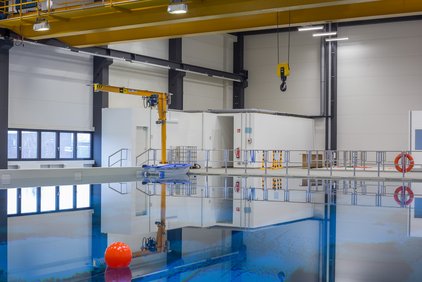
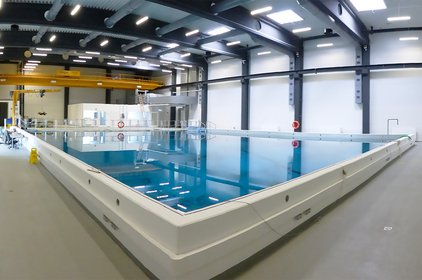
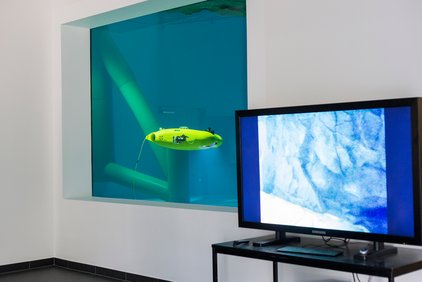
Large saltwater basin
The heart of the facility is a large basin filled with saltwater, measuring 23 m x 19 m x 8 m. With 3.4 million liters of saltwater research conditions are created which are controllable and observable and are not subject to changes in weather. A 2 m x 3 m window close to ground level allows observers to look from the foyer of the new DFKI building in Robert-Hooke-Straße 1 into the large basin.
Separate test basins
Moreover, the Maritime Exploration Hall comprises a glass tank containing 40.000 liters with three glass walls for optimum oberservation of test runs. A further test basin, the so-called black tank, can be covered to shield it against external light and permitting control of the water turbidity. A gentry crane with a lifting capacity of 500 kgs spans the whole basin area.

Glass tank 40 m³
| Max. capacity: | 40 m³ |
| Size (l x w x d): | 5 m x 4 m x 2.2 m |
| Material: | Glass and steel |
| Observability: | Full observability from outside the tank through 3 glass walls |
| Water treatment: | Circulation efficiency max. 28 m³/h Monolayer-sand-filtration UV-sterilization 75 W Automatic regulation of water parameters |
| Specificity: | Complete observability of outside |
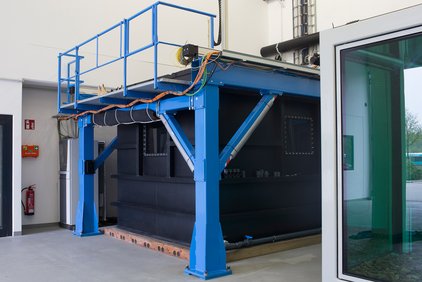
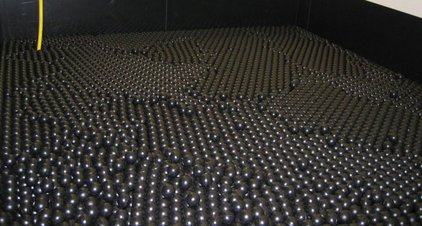
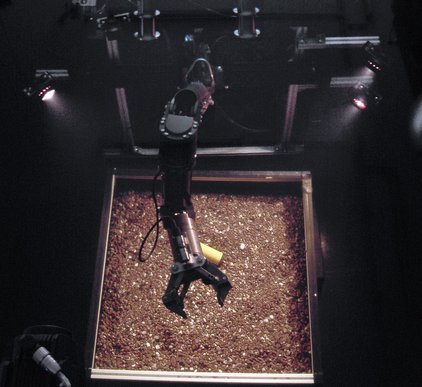
Black tank 20 m³
| Max. capacity: | 20 m³ |
| Size (l x w x d): | 3.4 m x 2.6 m x 2.2 m |
| Material: | PE (black) |
| Observability: | Through 2 small observation windows |
| Water treatment: | Circulation efficiency max. 28 m³/h Monolayer-sand-filtration UV-sterilization 40 W Automatic regulation of water parameters |
| Specificity: | Optical simulation of underwater environments without external light |
| Gantry crane: | |
| Manufacturer: | Parker Hannifin |
| Axis: | 3 (X, Y, Z) |
| Type: | X/Y-axis: HPLA120 Z-axis: HZR100 |
| Maximum speed: | 5 m/s |
| Maximum acceleration: | 10 m/s² |
| Nominal drive torque: | X/Y: 74.2 Nm Z: 57.3 Nm |
| Repeat accuracy: | +/- 0.2 mm |
| Live load: | 1500 N |
| Max traversing distance: | X: 3400 mm Y: 2600 mm Z: 2000 mm |
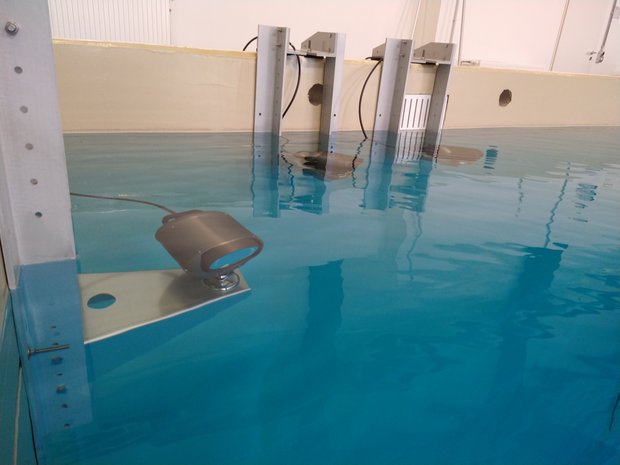

Infrastructure
Underwater motion tracking system
A technique from the film and games industry is used to locate the robot systems in the large saltwater pool with millimeter precision: 3D motion capturing. A total of twelve cameras detect optical markers on the robots and use them to calculate their exact position and location in the pool. This data can be used to evaluate the precision of the robots and their sensors.
| Manufacturer | Qualisys AB |
| Cameras | 12 pieces |
| Resolution | 12 megapixels per camera |
| Sampling rate | 300 Hz |
| Accuracy | Approx. 4 mm |
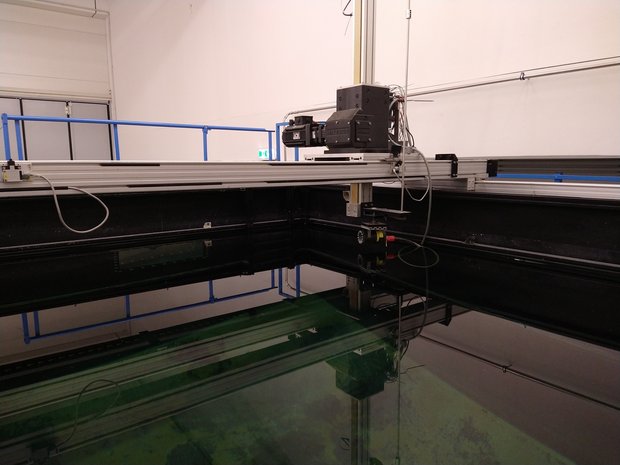
Portalkran
The Black Basin is equipped with a powerful gantry crane with three translational axes. The gantry crane can be used to move and position sensors, samples and other experimental objects precisely in the water.
| Manufacturer: | Parker Hannifin |
| Axes: | 3 (X, Y, Z) |
| Maximum speed: | 5 m/s |
| Maximum acceleration: | 10 m/s² |
| Repeatability: | +/- 0,2 mm |
| Payload: | 1500 N |
| Maximum travel: | X: 3400 mm Y: 2600 mm Z: 2000 mm |
Pressure chamber
How do materials behave under high pressures? How does the behavior of sensors and actuators change in the deep sea? Can seals withstand the high pressure? To answer these questions, the Maritime Exploration Hall has a pressure chamber that can generate pressures of up to 660 bar. This corresponds to a water depth of 6,600 meters.
| Maximum pressure: | 660 bar (corresponds to a water depth of about 6,600 meters) |
| Volume: | 75 l |
| Dimension: | Inner diameter: 40 cm Usable depth: 60 cm |
| Observation possibilities: | Observation by Kemara |
| Equipment: | gantry crane |
| Electrical feed-through: | Up to 48 lines (max. 8 A current feed-through.) |
Further information: Pressure chamber
Videos
Test Center for Maritime Technologies on Helgoland

The Test Center for Maritime Technologies on Helgoland is a facility of the Fraunhofer Institute for Manufacturing Technology and Advanced Materials IFAM and the Robotics Innovation Center of the German Research Center for Artificial Intelligence GmbH (DFKI). Here, materials, components, and systems for maritime use can be tested and tried out under realistic conditions and with scientific support in an offshore test field with a depth of up to 45 meters.
PULSAR: Underwater Demonstration of Large-scale Space Robotics

Space robotics is a key technology for space exploration and an enabling factor for future missions, both scientific and commercial. Underwater tests are a valuable tool for validating robotic technologies for space. In DFKI’s test basin, even large robots can be tested in simulated micro-gravity with mostly unrestricted range of motion.
In the project PULSAR, DFKI and European partners have developed technology for the autonomous in-orbit assembly of next-generation space telescopes. Three robot demonstrators were developed to validate the technology. In this video, one of these demonstrators is presented in detail: the underwater-based demonstrator of Large Structure Assembly in Free-Floating Environment – dLSAFFE.
PULSAR - Prototype of an Ultra Large Structure Assembly Robot

Maritime Exploration Hall (bird's eye view)

The Maritime Exploration Hall serves to test new robotic technologies on and under water.
